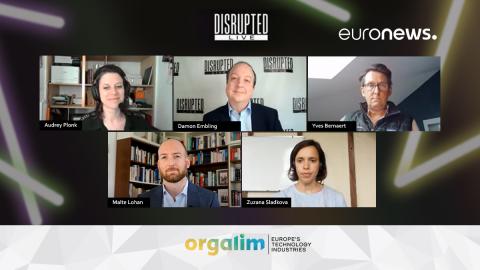How can digital transformation drive productivity & equality?
19 May 2021

Europe may be lagging behind on the consumer side of the digital revolution but we are in pole position to be leading the digital transformation of industry, said Malte Lohan, Orgalim's Director General, speaking at the Euronews Disrupted Live debate yesterday.
Hosted by Euronews in partnership with Accenture, the live event zeroed in on the key challenges and opportunities of the accelerating digital transformation in Europe. Speaking on behalf of Europe’s technology industries, Mr Lohan set the scene by highlighting the extent of the opportunity represented by the so-called 4th Industrial Revolution.
"It is perhaps not so visible to the individual citizen, but where the real value is, certainly for Europe as an economic power, is in the digitalisation of the industry. That is what is going to generate our future growth, our future prosperity, by making our production processes smarter, more efficient and by being best in class when it comes to delivering the products of tomorrow," he said. And, he added, of the 25 countries worldwide who are best placed to lead this industrial transformation, according to the World Economic Forum, 18 are in Europe. "We have to protect this leadership position, to generate sustainable prosperity for Europe and its citizens."
We have to protect Europe’s leadership position in the digitalisation of industry, to generate sustainable prosperity for Europe and its citizens.
What are the challenges involved in grasping this massive opportunity and, particularly, what does it mean for accessibility, equality and the gender gap? Panellists identified how digitalisation has the potential both to increase inequality but also to overcome it.
Audrey Plonk, Head of Division, Digital Economy Policy, OECD, highlighted that the pandemic has put into sharp relief the need to bridge some of the divides around access to high speed connectivity, which is a precursor for this teleworking environment, as well as education, socialising and a number of other ways to engage in economic productivity during the pandemic.
Zuzana Sladkova, Policy Leader Fellow at School of Transnational Governance, EUI, pointed to the work that still needs to be done to increase the number of women in the tech sector. "Now we have the 4th Industrial Revolution in front of us and we need to address the needs of the women and put the women at the core of it." Yves Bernaert, Senior Managing Director for Europe, Accenture Technology, showed the way forward, describing how, by making it a core business objective and offering more flexible working conditions, his organisation has been shrinking the gender gap at all levels and is three years away from being fully gender equal.
Now we have the 4th Industrial Revolution in front of us and we need to address the needs of the women and put the women at the core of it.
From the industry perspective, Mr Lohan said, "it should be a no-brainer and I'm confident we're finally beginning to see this mindset shift but we still have a long way to go." Women leaders – including Orgalim President Rada Rodriguez – are speaking up much more than they have in the past, he said, and the industry is recognising that the lack of women is a huge problem, not just in principle but also as a matter of competitiveness.
The event was moderated by Euronews’ Damon Embling and is available to view here.

LATEST NEWS
How can we create a dynamic, competitive European high-tech manufacturing base?
Orgalim's key recommendations offer policymake...
